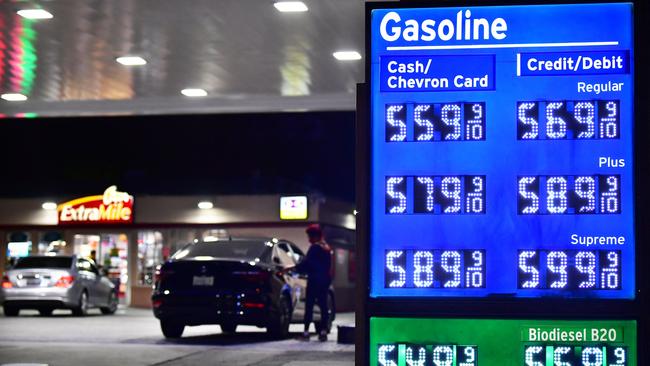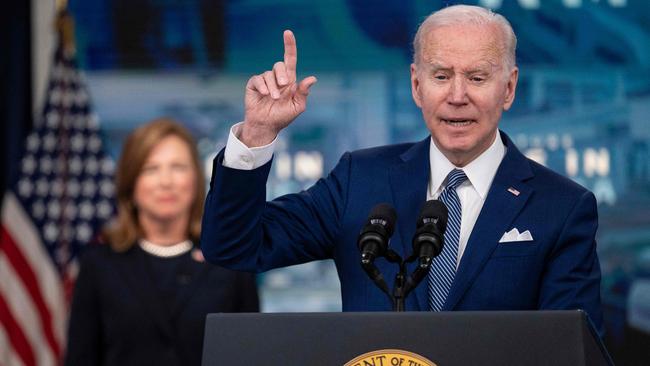Biden caught between inflation and calls to ban Russian oil
Politicians demand a ban to punish Russia over the invasion of Ukraine, but the move risks higher prices at the pump.

President Joe Biden is caught between conflicting demands that he tame rising consumer prices while banning Russian oil imports to punish Moscow for invading Ukraine, a sanction that would threaten even more inflation and raise pressure on allies with more dependence on oil imports.
The US said on Sunday it is in active discussions with allies about a ban. Those talks come as the Biden administration has faced criticism for months over inflation levels that have reached 40-year highs, driven by surging demand, supply chain constraints and labour shortages. But rising energy costs are also among the biggest contributors to higher consumer prices, with oil, gas and other commodity prices soaring to the highest levels in years.
Now, outrage over Russian bombing of civilian facilities in Ukraine has prompted politicians from across the political spectrum to demand the US ban imports of Russian oil. On Saturday, a bipartisan bill to ban such imports was gathering momentum in the US Senate, with 22 co-sponsors. House Speaker Nancy Pelosi says she supports the bill.
The pressure threatens to upset the White House’s balance between exacting further punishment on Moscow – as even Mr Biden’s own Democratic Party is now demanding – with keeping the oil flowing, particularly to US allies who are much more dependent on Russian oil and gas than the US.
For days, senior officials have walked a fine line, acknowledging calls to ban Russian oil, but also underscoring its importance to global markets, and Secretary of State Antony Blinken weighed in again on Sunday. “We are now talking to our European partners and allies to look in a co-ordinated way at the prospect of banning the import of Russian oil while making sure that there’s still an appropriate supply of oil on world markets,” Mr Blinken said on CNN. “That’s a very active discussion as we speak.”
Russia is the world’s third-largest oil producer, providing 10 per cent of global supply last year, according to the US Energy Information Administration. Oil traders say fear of restrictions on the flow of Russian energy caused a scramble for crude that drove oil prices up 25 per cent last week.

The upward spiral of oil prices has Mr Biden in a box: He will be unable to respond to calls to ban Russian imports without risking even-higher prices at the pump. High energy prices pose a vulnerability to Democrats ahead of November midterm elections, while leaders of US’s allies face similar political risks over energy.
“ Joe Biden’s failed agenda is to blame for the highest inflation in decades,” the Republican National Committee tweeted on Friday morning, just hours after Russian forces shelled Ukraine’s largest nuclear power plant and triggered another surge in commodity markets.
“The president is now backed into a cul-de-sac,” said Stephen Brown, a Democrat and former lobbyist for refining interests who now runs the consulting firm RBJ Strategies.
“The Republicans win this one either way,” Mr Brown said.
When the US and its European allies imposed historically harsh sanctions on Russia after its tanks rolled across the Ukrainian border in late February, they sought to levy those sanctions in ways that would avoid energy shortages and higher oil prices.
The US imposed sanctions on Russia’s largest banks – Sberbank and VTB – but provided broad exemptions on payments for natural gas, oil and petroleum products. It selected which Russian banks to eject from the Swift network in ways designed to minimise disruption of energy markets.
That effort failed. Oil markets have ignored such nuances, and banned or not, traders shunned Russian crude on fears it could ultimately draw government penalties or otherwise fund Russia’s war effort. The scramble to replace that supply with alternative sources sent US benchmark crude prices to $US118.11 a barrel on Friday, the highest mark since 2008.
US imports of Russian oil are, in fact, limited. About 8 per cent of all US imports of oil and refined products, or about 672,000 barrels a day, came from Russia last year, according to Andy Lipow, president of Lipow Oil Associates, citing EIA data. The EU, by contrast, has imported as much as 27 per cent of its crude from Russia in recent years, according to EU statistics.
“We don’t import a lot of Russian oil,” Cecilia Rouse, chair of the White House Council of Economic Advisers, said on Friday. But Canada already has banned Russian oil imports, and British leaders have openly discussed the appeal of a similar move. A US ban could put pressure on other allies to follow suit, and such a concerted effort might mean shortages that drive up prices for everybody.
The Labour Department, meanwhile, will release the consumer-price index for February on Thursday, after the CPI in January showed an annual inflation rate of 7.5 per cent, a level unseen since 1982.
On Sunday, the nation’s average gasoline price surpassed $US4 a gallon for the first time since 2008, according to AAA, which tracks retail prices daily.
Mr Biden has spent months trying to reassure voters troubled by inflation, and has co-ordinated with other governments to address surging prices by releasing oil reserves and increasing supply. “I know this is hard and that Americans are already hurting,” Mr Biden said last month.
Despite the inflationary risks, Sen. Joe Manchin (D., W.Va.), the chair of the Senate’s Energy and Natural Resources Committee, and the panel’s top Republican, Lisa Murkowski of Alaska, announced the bill Thursday to ban imports of Russian fossil fuels.
Pressed by reporters about the consequences for US consumers, Mr Manchin said he would gladly pay 10 cents a gallon more for gasoline to help the Ukrainians. Mr Manchin has been vocal about his inflation fears, criticising price increases as a tax on American consumers.
But, he said, “This is war.”
The oil industry itself has come out in support of a ban. US refiners had already started shrinking their Russian supplies late last year. The refiners’ trade group American Fuel & Petrochemical Manufacturers shared with politicians and their staff the group’s views on how to limit supply disruptions resulting from a ban, and has said it supports a ban on new US purchases of Russian crude.
Mr Biden has sought to promote renewable energy as part of his strategy to address the inflationary impact of fossil fuels, the prices of which can be volatile. But that is a long-term solution at best.
Republicans, instead, want Mr Biden to “reverse his policies,” 25 Republican governors said in a letter they signed Friday. Their prescription is less help for clean fuel and lighter environmental regulations; more oil-and-gas lease sales and permitting on federal lands; and faster permitting for oil-and-gas pipelines. Industry analysts say those moves, too, would take years to boost energy supplies.
On Thursday, Sen. Rob Portman (R., Ohio) blamed the Biden administration directly for slowing industry development on public lands and for its decision to revoke a key permit for the Keystone XL oil pipeline.
Ms Murkowski said Mr Biden could calm markets with a speech committing to boost domestic energy production. “But right now, the signal from this administration is we’re going to keep ours in the ground and we’re going to count on it from somewhere else,” she said.
“And now we’re realising we’ve been counting on Russia to help us with that,” Ms. Murkowski said.
Sabrina Siddiqui contributed to this article
The Wall Street Journal







To join the conversation, please log in. Don't have an account? Register
Join the conversation, you are commenting as Logout